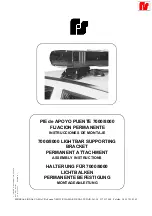
WARNING LIGHTS AND CHIMES
Warning lights and gauges can alert you to a vehicle condition that may
become serious enough to cause expensive repairs. A warning light may
illuminate when a problem exists with one of your vehicle’s functions.
Many lights will illuminate when you start your vehicle to make sure the
bulb works. If any light remains on after starting the vehicle, have the
respective system inspected immediately.
Emission system/Check engine:
The
Check Engine
indicator light
illuminates when the ignition is first
turned to the ON position to check
the bulb. Solid illumination after the engine is started indicates the On
Board Diagnostics System (OBD-II) has detected a malfunction. Refer to
On board diagnostics (OBD-II)
in the
Maintenance and Specifications
chapter. If the light is blinking, engine misfire is occurring which could
damage your catalytic converter. Drive in a moderate fashion (avoid
heavy acceleration and deceleration) and have your vehicle serviced
immediately.
Under engine misfire conditions, excessive exhaust temperatures
could damage the catalytic converter, the fuel system, interior
floor coverings or other vehicle components, possibly causing a fire.
Check fuel cap:
Illuminates when
the fuel cap may not be properly
installed. Continued driving with
this light on may cause the Emission
system/Check engine warning light
to come on. Refer to
Fuel Filler Cap
in the
Maintenance and
Specifications
chapter.
CHECK
FUEL
CAP
REVIEW COPY
2005 Thunderbird
(tbr)
, Owners Guide (post-2002-fmt)
(own2002)
,
Market:
USA_English
(fus)
Instrument Cluster
Instrument Cluster
10











































